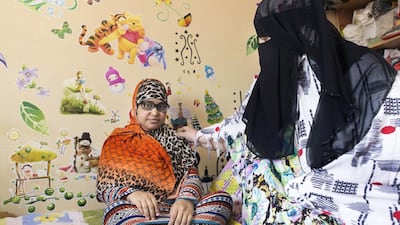Each week The National reports on a family in a desperate situation and the work of the Dar Al Ber Society trying to help them. Today we look at the plight of a Yemeni family.
AJMAN // Of her seven children, there are three that 50-year-old Tslam Al Karbi has never had a conversation with.
Confined to wheelchairs, Asma, aged 37, Shaima, 27, and Khaled, 26, are deaf and mute.
Living in a two-bed apartment in Ajman, the Yemeni expatriate’s three disabled children share one room – which they rarely leave.
“They never come out of the room,” Tslam says. “I can’t take them out. The stairs are too narrow and too steep and I can’t carry them. I am glad I now have my two sons with me and they help me with Asma and Shaima and Khaled, but it’s still impossible to take their wheelchairs down the stairs.”
Despite the hardships the family has faced the move to the UAE from Somalia, 30 years ago, provided a way out of their past life.
“We thought that the UAE would be a better opportunity of us, and we are very grateful that they have taken us in,” Tslam says. “We would be dead if we were in Yemen.”
However, unable to financially care for all of her children, their mother, who is married to her first cousin, is looking to the community for support.
As well as the costs involved in making sure her three disabled children receive care, which would be covered for Emiratis, lack of funds has prevented Tslam’s remaining children from fulfilling their potential.
The family survives on the earnings of father Ali, who works in Abu Dhabi and takes home Dh3,500 a month. It is not enough to put their four other children, including high school graduate Amer, through higher education.
Looking to study aeronautical engineering, Amer’s goals were set aside after a Fujairah university laid out the costs of taking the degree – Dh50,000.
There was hope, though, after the news led to his older brothers moving to Yemen in order to provide support.
“My elder sons Abdullah and Saleh said they would work so that their younger brother Amer could go on to university,” says Tslam, whose weight issues and illiteracy prevent her from working. But the money sent to Ajman by the two boys, who worked as taxi drivers, provided little support. And, while they worked, their mother was left to care for her housebound children. No easy task when you are dangerously overweight.
“The wheelchairs are heavy so taking them to the bathroom and washing them is very difficult,” she says, her husband unable to help due to spending his working week in Abu Dhabi. Things were further hampered when Yemen was struck by natural disaster, resulting in Abdullah moving back to the family home.
“Abdullah came to visit us but Yemen was hit by the cyclone and he couldn’t go back,” Tslam says, adding that his car was lost in the ensuing floods.
Now, the family face further issues, recently being threatened with eviction after being unable to supply their landlord with post-dated cheques for a year’s rent – Dh30,000 – upfront.
“My husband’s job pays him in cash. We don’t have a bank account. Nobody in the family does. How can we have a bank account when we have no money? What my husband makes goes to the rent and food.”
Pressing issues aside, of which there are many, Tslam has a simple aim for Asma, Shaima and Khaled.
“I’d be happy if I lived in a tent on the streets just as long as I can take them out to have some fresh air. They can’t hear or talk, so I would like them to at least enjoy seeing the outdoors, the trees, the sun, the birds – especially now that Shaima is losing her eyesight,” Tslam says.
“We sincerely hope that through the kindness of the community, we can help. Three disabled children stuck in a room; two more in Yemen with a mother fretting over their safety, one son cannot afford to continue his education and, above all the family will be evicted soon,” says Hisham Al Zahrani, manager of social services at Dar Al Ber Society.
salnuwais@thenational.ae

